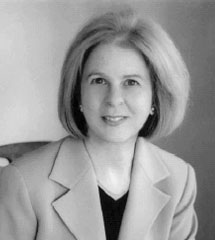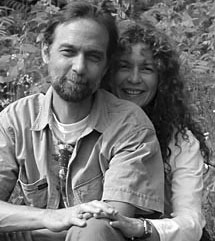|
May/June,
2003
| Featured Guests and Book Reviews
In each issue, we'll take a look at
some of the recent work our guests are doing. In addition to pointing out
some great reading (or viewing or listening), we'll take the opportunity
to introduce you to some of the participants in the Mythic Journeys conference.
In this issue, we're reviewing two books Beyond
Belief: The Secret Gospel of Thomas by Elaine Pagels and Tapping
the Dream Tree by Charles de Lint. This month's reviewer
is John Adcox. Reviews presented here are the opinion of the reviewer. |
 |
Dr. Elaine Pagels
Dr. Pagels, who became a professor
of religion at Princeton University in 1982 shortly after receiving a MacArthur
Fellowship, is arguably the best-known Biblical scholar in the world. She
is perhaps best known as the author of The Gnostic Gospels (for
which she won the National Book Award), The Origin of Satan, and
Adam,
Eve and the Serpent. She has published widely on Gnosticism and early
Christianity, and continues to pursue research interests in late antiquity.
A frequent television guest of Bill Moyers, Dr. Pagels is an incredibly
charismatic and engaging speaker. |
In her new book, Beyond Belief:
the Secret Gospel of Thomas, Dr. Pagels presents a convincing argument
that the canonical Gospel of John (in which the apostle "Doubting Thomas"
comes across as something of a fool) was written as a reaction to the earlier
Gnostic Gospel of Thomas, which claims to contain the secret teachings
of Jesus. In Thomas, we find many of the familiar sayings from the New
Testament, but sometimes in slightly different or unfamiliar contexts.
We also find some unfamiliar ideas, such as when Jesus says, "behold, the
kingdom of Heaven is within you," or "split a piece of wood; I am there.
Lift up the stone, and you will find me there."
Dr. Pagels' scholarship is as thorough
as ever as she paints a picture of the early Christian church and the surprising
struggles that, over the four centuries after the life Christ, went into
developing "orthodox" Christian beliefs and a canon of scripture. To stabilize
the emerging church in times of political unrest and devastating persecution,
the church fathers established the canon, creed and hierarchy. In the process,
some spiritual resources were suppressed and lost. The wide spectrum of
reasons, church leaders chose not to include some gospels and include others.
Dr. Pagels looks at the books that were embraced by the developing church,
as well as the books that were left out. Finally, she makes a passionate
case that Christianity can benefit by rediscovering the Thomas gospel.
As she demonstrates, what matters most in Christianity involves more than
any one set of beliefs. As she writes, "the impulse to seek God overflows
the banks of a single tradition."
While Beyond Belief: the Secret
Gospel of Thomas is an extraordinarily intelligent and well-researched
book, it is extremely accessible and engagingly written. The material itself
is fascinating, and Dr. Pagels presents it with the flair of a mystery
thriller writer. More, Dr. Pagels candidly interweaves her own spiritual
quest, which took on new urgency following a devastating series of personal
tragedies. The result is more than dry history. An intellectual feast,
Dr. Pagels has reopened the question of whether Christianity is better
understood as a system of doctrines or a means of seeking a deep and meaningful
connection with the Divine.
Part brilliant scholarship, part "page
turner" mystery story, and part religious quest, Dr. Pagels has managed
to create a moving testament of inspiration and hope that is certain to
help seekers reconnect with their faith traditions in powerful new ways. |

Charles de Lint with his
wife,
the artist MaryAnn Harris |
Charles de Lint
Novelist Charles de Lint is one of
the pioneers of a relatively new literary genre, Urban Fantasy or Mythic
Fiction. In Urban Fantasy, the city is the new forest, the dark an unknown
place where myths and fairy tales are born. There is magic, as there is
in the fantasies of, say, J.R.R. Tolkien, but it is not in some lost, far
away Middle Earth. It is closer than that; it is subtle, hidden, one step
sideways or just around the next corner. In that sense, his novels are
in many ways closer to the poetic "magic realism" of Isabel Allende, Alice
Hoffman, Mark Helprin, and Ray Bradbury. |
Here, the giants, tricksters, faeries,
animal powers, and bards of myth wear new guises. Pixel Pixies travel through
the Internet, a tree of tales grows in a city, and two dark, laughing,
punkish girls are crow spirits older than the world. As with all good fairy
tales and myths, Charles' stories are rich with archetype and metaphor.
After all, the breadcrumb path through the forest is our own journey through
life.
Charles is the author of Moonheart,
Spiritwalk, Yarrow, and Jack of Kinrowan (a modern retelling
of the fairy tale Jack the Giant Killer), all set in his hometown, Ottawa.
His more recent novels, including Some Place To Be Flying, Forests of
the Heart, and The Onion Girl, are set in the fictitious city
of Newford. Newford was first introduced in a collection of short stories,
Dreams
Underfoot, and was further explored in the follow-up collections,
The
Ivory and the Horn and Moonlight and Vines.
His most recent book, Tapping
the Dream Tree, is a new collection of contemporary urban myths
and fairy tales set in Newford. Charles' voice has matured considerably
since the first collection -;his writing has never been stronger. But the
stories have lost none of their charm, and more than a few of them will
surprise you with their archetypal depth. Along with his wife, artist MaryAnn
Harris, Charles is an accomplished folk musician, and that voice rings
through in his elegant prose.
If I have one complaint about the book,
it is that it is not the best place to start reading Charles' work. True,
the stories stand alone. But you'll find a much deeper resonance if you
already know the city and its citizens. Many of the characters and situations
that appear here have turned up in earlier stories, and seeing them again
is like running into old friends. It's great to see what's happened to
them since last time. Tapping the Dream Tree is a stronger collection,
but the still-excellent Dreams Underfoot makes a far better introduction
to Newford. It's also a great idea to read it before any of the Newford
Novels, although they, too, stand alone. But that's a minor quibble. Tapping
the Dream Tree will delight fantasy fans, as well as those who've never
ventured across the isle to see what lurks on "those" shelves If you're
a fan of mythic fiction with surprising depth, archetypal significance,
and poetic resonance, give Charles a try. I think you'll be glad you did.
Visit
Charles on the Web.
You might also enjoy this poem.
Speaking of reviews, one of our speakers,
Dr. Greg Schrempp, recently reviewed a book by Andrew Von Hendy called
The
Modern Construction of Myth (Indiana University Press), and thought
it was a remarkable scholarly work. He recommends it highly. |
1
2
3
4
5
6
7
Next: Myth and Poetry
© copyright 2003, Mythic
Imagination Institute
|


